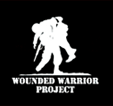Soldier Stories
The Bradley Family
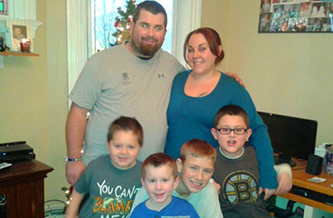
Charles, wife Sara and their children, Dante, Greyson, Charles Junior, and Evryn
The Kingston Family
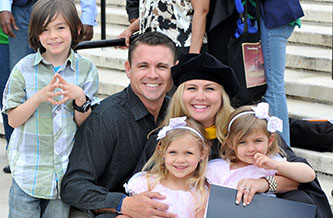
The Kingston Family
"It’s nice to have something positive to look forward to, and to be grateful for the little things in life." —The Kingston Family
The Hunnewell Family
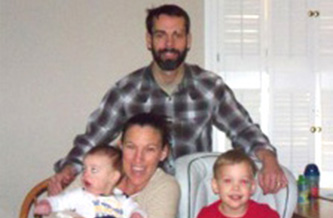
Stephen, wife Libbey and their children, Hunter and Hayden
"“Everyone wants to support the troops, but they don’t know the best way. That’s another reason why this program [Christmas Can Cure] is special. It’s giving something to the whole family.”" —The Hunnewell Family
The Kennedy Family
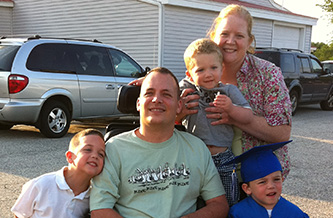
The Kennedy Family
The Adams Family
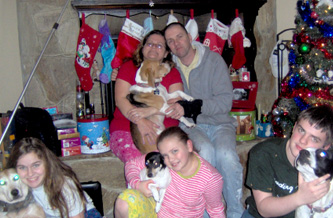
The Adams Family
The Strickland Family
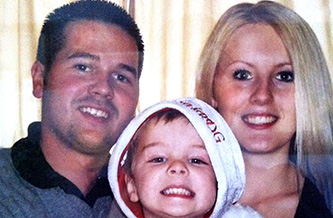
The Strickland Family
The Oliveira Family
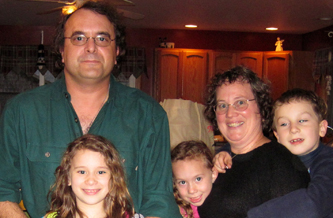
Navy Lt Commander John Oliveira, his wife, Amy (also a Navy Veteran), and their children, Victoria, Joao and Maria
The Platt Family
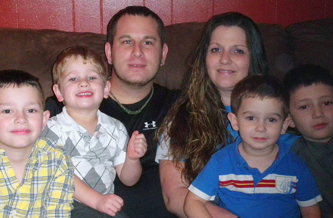
Specialist Eddie Platt, his wife, Sarah and four sons: Justin, Kyle, Johnny and Kaleb
Although known as paratroopers in WWII, the 101st now uses air-assault, rappelling down from Chinook or Black Hawk helicopters. “It was a four-day mission,” Eddie explained, “with almost continuous firing. We got the Seal out, and none of us got hurt. So we all had that feeling that we were invincible.” But when Eddie and his unit arrived in Iraq in April 2003, they were dealing with an entirely new situation. “We always felt fear because Iraqi soldiers wore civilian clothes, so it wasn’t clear-cut who the bad guys were,” he added.
Eddie and his unit were in control of the NW sector of Iraq, ensuring that no arms came across the border from Syria or Iran. “Many of the Iraqis had surrendered, so most of the people attacking us were from other countries,” Eddie explained. On September 23, 2003, as the platoon was finishing another presence patrol and returning to base, twenty-year-old Eddie Platt’s life changed forever.
The Martin Family
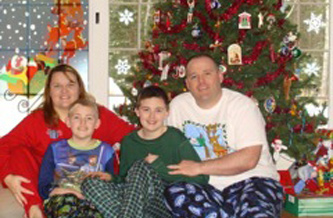
Donald "DJ" Martin and family from Lagrange, Maine
The Perez Family
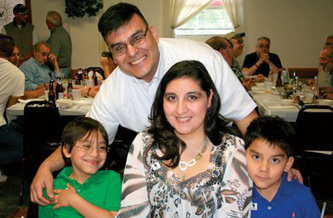
Delaney "Rocky" Perez and family from Texas
The Hardin Family
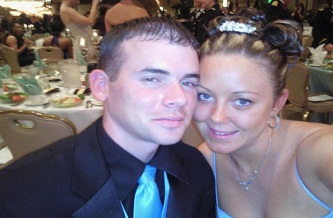
Kevin Hardin and Lillian May from Killeen, Texas
In 2007, Kevin Hardin, a Front Line Army Medic, was severely injured in Iraq when the Hum-V he was driving was hit by a rocket-propelled grenade (RPG). He endured over 32 surgeries over two years. Kevin has injuries to both of his arms including a fused wrist and the loss fingers. He has more than a dozen pieces of shrapnel in his brain which are inoperable. He spent two years at Walter Reed Army Medical Center where he met the love of his life, Lillian May. They were engaged in August of 2009. They were married in April of 2010 in a courthouse that used to be a gas station. Their families were happy for them but they believed the couple deserved a real wedding. Kevin's mother wrote to Christmas Can Cure asking for a fairytale wedding for her son.
The wedding will be Saturday, November 13th, Veterans Day weekend, at Eureka Casino Resort in Mesquite, Nevada. For the full story and to read the letter from Kevin's mom click here.
The Ugliono Family
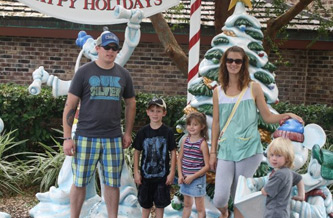
Sgt Shane Ugliono and his family from Hawthorne, New Jersey
Assigned to the 101st Airborne, Shane was leading his five-man team in Samarra, Iraq in January 2008 when his unit was ambushed by 20 or more insurgents. A firefight ensued that would last more then 45 minutes. Shane’s team was not captured that day, they fought back the insurgents but the costs were great. Three members of Shane’s team had been killed. Shane himself had been shot 16 times, with four shots to the head. His left arm is paralyzed and he’s living with the consequences of traumatic brain injury. Shane’s commitment to his troops is a testament to the character of the armed forces; his incredible spirit makes him a role model for us all. When Shane first learned of Christmas Can Cure last year he immediately wanted in. He wrote on his application that he wanted this experience for his wife and children, that it had been a difficult year for his family and that they could benefit from celebrating a wonderful Christmas together. We are honored to be hosting Shane, his wife Kerri and his children Tyler (6), Taryn (5), and Teagen (2).
The Quiroz family
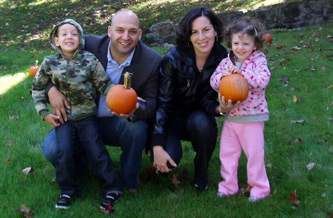
William Quiroz and his family from West Haven, Connecticut
William and his Alpha Company 6th Communication BN FSSG Division served during Operation Iraqi Freedom. Injured during his service at the time of the invasion in 2003, William returned home and with his wife, Desiree, has worked to start a family. They are excited for what they hope will be a white Christmas celebration with their son David (4), and daughter Isabella (2).
The Luce family
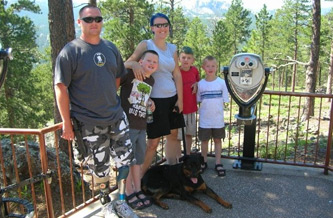
Sgt. Jared Luce and his family from Coventry, Connecticut
Jared is a double amputee who is looking forward to the many snow activities the White Mountains have to offer. He’s a family man and looks forward to giving back to his loved ones with Christmas Can Cure. “I am looking forward to building snow forts with my three boys!” Jared will join us in New Hampshire with his wife, Melanie, and three boys.
The Chidester Family
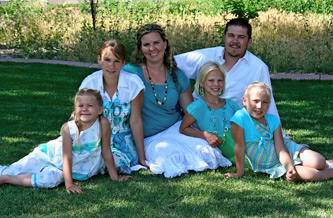
The Chidester Family from Fountain Green, UT
Originally a Cavalry Scout, Bradley was injured in Mosul in October of 2005 when a vehicle was detonated right next to his unit. The blast knocked him unconscious and sent shrapnel through his upper body and face. When he came to, he found himself in the middle of a firefight and returned fire without the use of his left arm. It was during this firefight that Bradley was shot in the leg. The injuries Bradley incurred on this day have had many lingering consequences and he has been guided and supported in his recovery by his wife, Chante, and his four daughters, Madison (12), Mickell (10), Brianna (8), and Sierra (6).
"My family lives with the effects of the war each and every day," said Bradley. "It’s difficult to be a child who lives with an injured Dad. My wife and my children have been injured by the war. I believe Christmas Can Cure could be the catalyst for change in my family…I want to see my wife and children smile again, to see the sparkle in their eyes and hear excitement in their voices."
The Perez Family
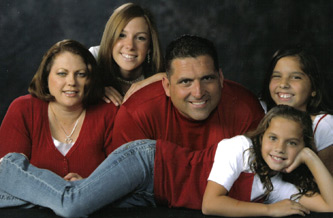
The Perez Family from Logandale, NV
Staff Sergeant Joseph D. Perez first enlisted in the Marine Corps in 1988 and served until 1996. In 1999 he heard the call to serve again and this time joined the US Army as a Sgt. in the Military Police. While in Iraq in 2003, Joe suffered serious injuries resulting from a mortar attack at a prison riot at Abu Ghraib. The attack left Joe with a fused spinal cord, traumatic brain injuries, and substantial injures to his left leg. Joe has come a long way in his recovery, helped greatly by the love and support of his wife, Aileena, and their three daughters, Felicia (9), Marissa (12) and Ariel (17). Joe’s recovery has been so successful that he participated in the Wounded Warrior Project’s Soldier Ride in Las Vegas, biking through Summerlin with Warriors from across the country. Joe and his family live in Logandale, Nevada where they enjoy a very large extended family. Joe says he, his wife and daughters love Christmas and they are giddy about the trip. He is looking forward to seeing his daughters spoiled for a few days.
The Cortinas Family
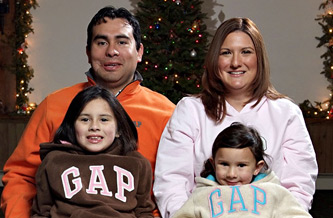
(Pictured from upper-left, clockwise: Jerry, Selena, Ally and Dion Cortinas)
"I feel like I am dreaming. We are actually pretty private and shy people, but this is so beautiful. I feel like saying to everyone 'Thank you, we are so grateful.'" —The Cortinas Family
Jerry and Celina Cortinas, along with their two daughters, Dion (age 8) and Ally (age 3), traveled to the Mt. Washington Valley in New Hampshire in December 2008 to kick off the first annual Christmas Can Cure. Hailing from Brownsville, Texas, the Cortinas children had never seen snow.
Jerry Cortinas served as a green beret in the U.S. Army Special Forces stationed in Afghanistan. In December 2002, he was loading a rocket grenade launcher when it exploded on site. He suffered extreme head trauma, which left him unconscious for 26 days. His left forearm and hand required amputation.
Before making the trip to New Hampshire, Selena Cortinas said, "As you can imagine, Christmas time for us is a bittersweet time. It is the anniversary of Jerry's accident. The kids absolutely love Christmas, and I try to make it special for them, but with limited money and the memories of the worst time of our lives, it is a tough situation. This trip will fill the month with good memories that we can associate with December, instead of a very bad one."
"This is a dream," said Selena Cortinas, upon arriving in New Hampshire. "I feel like I am dreaming. We are actually pretty private and shy people, but this is so beautiful. I feel like saying to everyone 'Thank you, we are so grateful.'"
The Mitchell Family

(Pictured from top, clockwise: Zac, Roy, Jerrett, Serenity, Michelle)
"We have had a long road since 2003... I have had 37 surgeries to date and a lot of rehab. If I could, I would not change a thing, except having more time with my family." —The Mitchell Family
Sgt. 1st Class Roy Mitchell and his family joined the Cortinas family in New Hampshire last year for the first annual Christmas Can Cure. Mitchell and his family - wife Michelle, and children Zac (age 16), Jerrett (age 6), and Serenity (age 3) - call Fort Drum home in New York state.
Mitchell was injured in Afghanistan on November 23, 2003, requiring an above-the-knee amputation. He also suffered shrapnel wounds to the face and torso, and third degree burns.
"We have had a long road since 2003," Mitchell wrote in a letter to Christmas Can Cure. "I have had 37 surgeries to date and a lot of rehab. If I could, I would not change a thing, except having more time with my family. Since 2003, we have been able to have family time during the holidays just three times out of the last six. It just starts to take a toll on the family bond."
Michelle Mitchell said she felt a transformation as soon as her family drove over the covered bridge and into the village of Jackson, New Hampshire.
"There was no tension. There are no words to describe what people are doing for us."

Deprecated: iconv_set_encoding(): Use of iconv.output_encoding is deprecated in /home/o0z04hb7swmq/public_html/library/Zend/Service/Flickr.php on line 65
Deprecated: iconv_set_encoding(): Use of iconv.input_encoding is deprecated in /home/o0z04hb7swmq/public_html/library/Zend/Service/Flickr.php on line 66
Deprecated: iconv_set_encoding(): Use of iconv.internal_encoding is deprecated in /home/o0z04hb7swmq/public_html/library/Zend/Service/Flickr.php on line 67
Deprecated: iconv_set_encoding(): Use of iconv.internal_encoding is deprecated in /home/o0z04hb7swmq/public_html/library/Zend/Validate/Hostname.php on line 438
Deprecated: iconv_set_encoding(): Use of iconv.internal_encoding is deprecated in /home/o0z04hb7swmq/public_html/library/Zend/Validate/Hostname.php on line 540
Deprecated: iconv_set_encoding(): Use of iconv.internal_encoding is deprecated in /home/o0z04hb7swmq/public_html/library/Zend/Validate/Hostname.php on line 438
Deprecated: iconv_set_encoding(): Use of iconv.internal_encoding is deprecated in /home/o0z04hb7swmq/public_html/library/Zend/Validate/Hostname.php on line 540
Deprecated: iconv_set_encoding(): Use of iconv.internal_encoding is deprecated in /home/o0z04hb7swmq/public_html/library/Zend/Validate/Hostname.php on line 438
Deprecated: iconv_set_encoding(): Use of iconv.internal_encoding is deprecated in /home/o0z04hb7swmq/public_html/library/Zend/Validate/Hostname.php on line 540
Deprecated: iconv_set_encoding(): Use of iconv.internal_encoding is deprecated in /home/o0z04hb7swmq/public_html/library/Zend/Validate/Hostname.php on line 438
Deprecated: iconv_set_encoding(): Use of iconv.internal_encoding is deprecated in /home/o0z04hb7swmq/public_html/library/Zend/Validate/Hostname.php on line 540
Deprecated: iconv_set_encoding(): Use of iconv.internal_encoding is deprecated in /home/o0z04hb7swmq/public_html/library/Zend/Validate/Hostname.php on line 438
Deprecated: iconv_set_encoding(): Use of iconv.internal_encoding is deprecated in /home/o0z04hb7swmq/public_html/library/Zend/Validate/Hostname.php on line 540
Deprecated: iconv_set_encoding(): Use of iconv.internal_encoding is deprecated in /home/o0z04hb7swmq/public_html/library/Zend/Validate/Hostname.php on line 438
Deprecated: iconv_set_encoding(): Use of iconv.internal_encoding is deprecated in /home/o0z04hb7swmq/public_html/library/Zend/Validate/Hostname.php on line 540
Deprecated: iconv_set_encoding(): Use of iconv.internal_encoding is deprecated in /home/o0z04hb7swmq/public_html/library/Zend/Validate/Hostname.php on line 438
Deprecated: iconv_set_encoding(): Use of iconv.internal_encoding is deprecated in /home/o0z04hb7swmq/public_html/library/Zend/Validate/Hostname.php on line 540
Deprecated: iconv_set_encoding(): Use of iconv.internal_encoding is deprecated in /home/o0z04hb7swmq/public_html/library/Zend/Validate/Hostname.php on line 438
Deprecated: iconv_set_encoding(): Use of iconv.internal_encoding is deprecated in /home/o0z04hb7swmq/public_html/library/Zend/Validate/Hostname.php on line 540
Deprecated: iconv_set_encoding(): Use of iconv.internal_encoding is deprecated in /home/o0z04hb7swmq/public_html/library/Zend/Validate/Hostname.php on line 438
Deprecated: iconv_set_encoding(): Use of iconv.internal_encoding is deprecated in /home/o0z04hb7swmq/public_html/library/Zend/Validate/Hostname.php on line 540
Deprecated: iconv_set_encoding(): Use of iconv.internal_encoding is deprecated in /home/o0z04hb7swmq/public_html/library/Zend/Validate/Hostname.php on line 438
Deprecated: iconv_set_encoding(): Use of iconv.internal_encoding is deprecated in /home/o0z04hb7swmq/public_html/library/Zend/Validate/Hostname.php on line 540
Deprecated: iconv_set_encoding(): Use of iconv.internal_encoding is deprecated in /home/o0z04hb7swmq/public_html/library/Zend/Validate/Hostname.php on line 438
Deprecated: iconv_set_encoding(): Use of iconv.internal_encoding is deprecated in /home/o0z04hb7swmq/public_html/library/Zend/Validate/Hostname.php on line 540
Deprecated: iconv_set_encoding(): Use of iconv.internal_encoding is deprecated in /home/o0z04hb7swmq/public_html/library/Zend/Validate/Hostname.php on line 438
Deprecated: iconv_set_encoding(): Use of iconv.internal_encoding is deprecated in /home/o0z04hb7swmq/public_html/library/Zend/Validate/Hostname.php on line 540
Deprecated: iconv_set_encoding(): Use of iconv.internal_encoding is deprecated in /home/o0z04hb7swmq/public_html/library/Zend/Validate/Hostname.php on line 438
Deprecated: iconv_set_encoding(): Use of iconv.internal_encoding is deprecated in /home/o0z04hb7swmq/public_html/library/Zend/Validate/Hostname.php on line 540
Notice: Undefined variable: out in /home/o0z04hb7swmq/public_html/application/helpers/GetFlickr.php on line 18
Notice: Trying to get property of non-object in /home/o0z04hb7swmq/public_html/application/helpers/GetFlickr.php on line 19
Deprecated: iconv_set_encoding(): Use of iconv.internal_encoding is deprecated in /home/o0z04hb7swmq/public_html/library/Zend/Validate/Hostname.php on line 438
Deprecated: iconv_set_encoding(): Use of iconv.internal_encoding is deprecated in /home/o0z04hb7swmq/public_html/library/Zend/Validate/Hostname.php on line 540
Deprecated: iconv_set_encoding(): Use of iconv.internal_encoding is deprecated in /home/o0z04hb7swmq/public_html/library/Zend/Validate/Hostname.php on line 438
Deprecated: iconv_set_encoding(): Use of iconv.internal_encoding is deprecated in /home/o0z04hb7swmq/public_html/library/Zend/Validate/Hostname.php on line 540
Deprecated: iconv_set_encoding(): Use of iconv.internal_encoding is deprecated in /home/o0z04hb7swmq/public_html/library/Zend/Validate/Hostname.php on line 438
Deprecated: iconv_set_encoding(): Use of iconv.internal_encoding is deprecated in /home/o0z04hb7swmq/public_html/library/Zend/Validate/Hostname.php on line 540
Deprecated: iconv_set_encoding(): Use of iconv.internal_encoding is deprecated in /home/o0z04hb7swmq/public_html/library/Zend/Validate/Hostname.php on line 438
Deprecated: iconv_set_encoding(): Use of iconv.internal_encoding is deprecated in /home/o0z04hb7swmq/public_html/library/Zend/Validate/Hostname.php on line 540
Notice: Trying to get property of non-object in /home/o0z04hb7swmq/public_html/application/helpers/GetFlickr.php on line 19
Deprecated: iconv_set_encoding(): Use of iconv.internal_encoding is deprecated in /home/o0z04hb7swmq/public_html/library/Zend/Validate/Hostname.php on line 438
Deprecated: iconv_set_encoding(): Use of iconv.internal_encoding is deprecated in /home/o0z04hb7swmq/public_html/library/Zend/Validate/Hostname.php on line 540
Deprecated: iconv_set_encoding(): Use of iconv.internal_encoding is deprecated in /home/o0z04hb7swmq/public_html/library/Zend/Validate/Hostname.php on line 438
Deprecated: iconv_set_encoding(): Use of iconv.internal_encoding is deprecated in /home/o0z04hb7swmq/public_html/library/Zend/Validate/Hostname.php on line 540
Deprecated: iconv_set_encoding(): Use of iconv.internal_encoding is deprecated in /home/o0z04hb7swmq/public_html/library/Zend/Validate/Hostname.php on line 438
Deprecated: iconv_set_encoding(): Use of iconv.internal_encoding is deprecated in /home/o0z04hb7swmq/public_html/library/Zend/Validate/Hostname.php on line 540
Deprecated: iconv_set_encoding(): Use of iconv.internal_encoding is deprecated in /home/o0z04hb7swmq/public_html/library/Zend/Validate/Hostname.php on line 438
Deprecated: iconv_set_encoding(): Use of iconv.internal_encoding is deprecated in /home/o0z04hb7swmq/public_html/library/Zend/Validate/Hostname.php on line 540
Deprecated: iconv_set_encoding(): Use of iconv.internal_encoding is deprecated in /home/o0z04hb7swmq/public_html/library/Zend/Validate/Hostname.php on line 438
Deprecated: iconv_set_encoding(): Use of iconv.internal_encoding is deprecated in /home/o0z04hb7swmq/public_html/library/Zend/Validate/Hostname.php on line 540
Deprecated: iconv_set_encoding(): Use of iconv.internal_encoding is deprecated in /home/o0z04hb7swmq/public_html/library/Zend/Validate/Hostname.php on line 438
Deprecated: iconv_set_encoding(): Use of iconv.internal_encoding is deprecated in /home/o0z04hb7swmq/public_html/library/Zend/Validate/Hostname.php on line 540
Deprecated: iconv_set_encoding(): Use of iconv.internal_encoding is deprecated in /home/o0z04hb7swmq/public_html/library/Zend/Validate/Hostname.php on line 438
Deprecated: iconv_set_encoding(): Use of iconv.internal_encoding is deprecated in /home/o0z04hb7swmq/public_html/library/Zend/Validate/Hostname.php on line 540
Deprecated: iconv_set_encoding(): Use of iconv.internal_encoding is deprecated in /home/o0z04hb7swmq/public_html/library/Zend/Validate/Hostname.php on line 438
Deprecated: iconv_set_encoding(): Use of iconv.internal_encoding is deprecated in /home/o0z04hb7swmq/public_html/library/Zend/Validate/Hostname.php on line 540
Deprecated: iconv_set_encoding(): Use of iconv.internal_encoding is deprecated in /home/o0z04hb7swmq/public_html/library/Zend/Validate/Hostname.php on line 438
Deprecated: iconv_set_encoding(): Use of iconv.internal_encoding is deprecated in /home/o0z04hb7swmq/public_html/library/Zend/Validate/Hostname.php on line 540
Deprecated: iconv_set_encoding(): Use of iconv.internal_encoding is deprecated in /home/o0z04hb7swmq/public_html/library/Zend/Validate/Hostname.php on line 438
Deprecated: iconv_set_encoding(): Use of iconv.internal_encoding is deprecated in /home/o0z04hb7swmq/public_html/library/Zend/Validate/Hostname.php on line 540
Deprecated: iconv_set_encoding(): Use of iconv.internal_encoding is deprecated in /home/o0z04hb7swmq/public_html/library/Zend/Validate/Hostname.php on line 438
Deprecated: iconv_set_encoding(): Use of iconv.internal_encoding is deprecated in /home/o0z04hb7swmq/public_html/library/Zend/Validate/Hostname.php on line 540
Deprecated: iconv_set_encoding(): Use of iconv.internal_encoding is deprecated in /home/o0z04hb7swmq/public_html/library/Zend/Validate/Hostname.php on line 438
Deprecated: iconv_set_encoding(): Use of iconv.internal_encoding is deprecated in /home/o0z04hb7swmq/public_html/library/Zend/Validate/Hostname.php on line 540
Deprecated: iconv_set_encoding(): Use of iconv.internal_encoding is deprecated in /home/o0z04hb7swmq/public_html/library/Zend/Validate/Hostname.php on line 438
Deprecated: iconv_set_encoding(): Use of iconv.internal_encoding is deprecated in /home/o0z04hb7swmq/public_html/library/Zend/Validate/Hostname.php on line 540
Deprecated: iconv_set_encoding(): Use of iconv.internal_encoding is deprecated in /home/o0z04hb7swmq/public_html/library/Zend/Validate/Hostname.php on line 438
Deprecated: iconv_set_encoding(): Use of iconv.internal_encoding is deprecated in /home/o0z04hb7swmq/public_html/library/Zend/Validate/Hostname.php on line 540
Deprecated: iconv_set_encoding(): Use of iconv.internal_encoding is deprecated in /home/o0z04hb7swmq/public_html/library/Zend/Validate/Hostname.php on line 438
Deprecated: iconv_set_encoding(): Use of iconv.internal_encoding is deprecated in /home/o0z04hb7swmq/public_html/library/Zend/Validate/Hostname.php on line 540
Deprecated: iconv_set_encoding(): Use of iconv.internal_encoding is deprecated in /home/o0z04hb7swmq/public_html/library/Zend/Validate/Hostname.php on line 438
Deprecated: iconv_set_encoding(): Use of iconv.internal_encoding is deprecated in /home/o0z04hb7swmq/public_html/library/Zend/Validate/Hostname.php on line 540
Notice: Trying to get property of non-object in /home/o0z04hb7swmq/public_html/application/helpers/GetFlickr.php on line 19
Notice: Trying to get property of non-object in /home/o0z04hb7swmq/public_html/application/helpers/GetFlickr.php on line 20
Deprecated: iconv_set_encoding(): Use of iconv.internal_encoding is deprecated in /home/o0z04hb7swmq/public_html/library/Zend/Validate/Hostname.php on line 438
Deprecated: iconv_set_encoding(): Use of iconv.internal_encoding is deprecated in /home/o0z04hb7swmq/public_html/library/Zend/Validate/Hostname.php on line 540
Deprecated: iconv_set_encoding(): Use of iconv.internal_encoding is deprecated in /home/o0z04hb7swmq/public_html/library/Zend/Validate/Hostname.php on line 438
Deprecated: iconv_set_encoding(): Use of iconv.internal_encoding is deprecated in /home/o0z04hb7swmq/public_html/library/Zend/Validate/Hostname.php on line 540
Deprecated: iconv_set_encoding(): Use of iconv.internal_encoding is deprecated in /home/o0z04hb7swmq/public_html/library/Zend/Validate/Hostname.php on line 438
Deprecated: iconv_set_encoding(): Use of iconv.internal_encoding is deprecated in /home/o0z04hb7swmq/public_html/library/Zend/Validate/Hostname.php on line 540
Deprecated: iconv_set_encoding(): Use of iconv.internal_encoding is deprecated in /home/o0z04hb7swmq/public_html/library/Zend/Validate/Hostname.php on line 438
Deprecated: iconv_set_encoding(): Use of iconv.internal_encoding is deprecated in /home/o0z04hb7swmq/public_html/library/Zend/Validate/Hostname.php on line 540
Notice: Trying to get property of non-object in /home/o0z04hb7swmq/public_html/application/helpers/GetFlickr.php on line 19
Notice: Trying to get property of non-object in /home/o0z04hb7swmq/public_html/application/helpers/GetFlickr.php on line 20
Deprecated: iconv_set_encoding(): Use of iconv.internal_encoding is deprecated in /home/o0z04hb7swmq/public_html/library/Zend/Validate/Hostname.php on line 438
Deprecated: iconv_set_encoding(): Use of iconv.internal_encoding is deprecated in /home/o0z04hb7swmq/public_html/library/Zend/Validate/Hostname.php on line 540
Deprecated: iconv_set_encoding(): Use of iconv.internal_encoding is deprecated in /home/o0z04hb7swmq/public_html/library/Zend/Validate/Hostname.php on line 438
Deprecated: iconv_set_encoding(): Use of iconv.internal_encoding is deprecated in /home/o0z04hb7swmq/public_html/library/Zend/Validate/Hostname.php on line 540
Deprecated: iconv_set_encoding(): Use of iconv.internal_encoding is deprecated in /home/o0z04hb7swmq/public_html/library/Zend/Validate/Hostname.php on line 438
Deprecated: iconv_set_encoding(): Use of iconv.internal_encoding is deprecated in /home/o0z04hb7swmq/public_html/library/Zend/Validate/Hostname.php on line 540
Deprecated: iconv_set_encoding(): Use of iconv.internal_encoding is deprecated in /home/o0z04hb7swmq/public_html/library/Zend/Validate/Hostname.php on line 438
Deprecated: iconv_set_encoding(): Use of iconv.internal_encoding is deprecated in /home/o0z04hb7swmq/public_html/library/Zend/Validate/Hostname.php on line 540
Notice: Trying to get property of non-object in /home/o0z04hb7swmq/public_html/application/helpers/GetFlickr.php on line 19
Notice: Trying to get property of non-object in /home/o0z04hb7swmq/public_html/application/helpers/GetFlickr.php on line 20
Deprecated: iconv_set_encoding(): Use of iconv.internal_encoding is deprecated in /home/o0z04hb7swmq/public_html/library/Zend/Validate/Hostname.php on line 438
Deprecated: iconv_set_encoding(): Use of iconv.internal_encoding is deprecated in /home/o0z04hb7swmq/public_html/library/Zend/Validate/Hostname.php on line 540
Deprecated: iconv_set_encoding(): Use of iconv.internal_encoding is deprecated in /home/o0z04hb7swmq/public_html/library/Zend/Validate/Hostname.php on line 438
Deprecated: iconv_set_encoding(): Use of iconv.internal_encoding is deprecated in /home/o0z04hb7swmq/public_html/library/Zend/Validate/Hostname.php on line 540
Deprecated: iconv_set_encoding(): Use of iconv.internal_encoding is deprecated in /home/o0z04hb7swmq/public_html/library/Zend/Validate/Hostname.php on line 438
Deprecated: iconv_set_encoding(): Use of iconv.internal_encoding is deprecated in /home/o0z04hb7swmq/public_html/library/Zend/Validate/Hostname.php on line 540
Deprecated: iconv_set_encoding(): Use of iconv.internal_encoding is deprecated in /home/o0z04hb7swmq/public_html/library/Zend/Validate/Hostname.php on line 438
Deprecated: iconv_set_encoding(): Use of iconv.internal_encoding is deprecated in /home/o0z04hb7swmq/public_html/library/Zend/Validate/Hostname.php on line 540
Deprecated: iconv_set_encoding(): Use of iconv.internal_encoding is deprecated in /home/o0z04hb7swmq/public_html/library/Zend/Validate/Hostname.php on line 438
Deprecated: iconv_set_encoding(): Use of iconv.internal_encoding is deprecated in /home/o0z04hb7swmq/public_html/library/Zend/Validate/Hostname.php on line 540
Deprecated: iconv_set_encoding(): Use of iconv.internal_encoding is deprecated in /home/o0z04hb7swmq/public_html/library/Zend/Validate/Hostname.php on line 438
Deprecated: iconv_set_encoding(): Use of iconv.internal_encoding is deprecated in /home/o0z04hb7swmq/public_html/library/Zend/Validate/Hostname.php on line 540
Deprecated: iconv_set_encoding(): Use of iconv.internal_encoding is deprecated in /home/o0z04hb7swmq/public_html/library/Zend/Validate/Hostname.php on line 438
Deprecated: iconv_set_encoding(): Use of iconv.internal_encoding is deprecated in /home/o0z04hb7swmq/public_html/library/Zend/Validate/Hostname.php on line 540
Deprecated: iconv_set_encoding(): Use of iconv.internal_encoding is deprecated in /home/o0z04hb7swmq/public_html/library/Zend/Validate/Hostname.php on line 438
Deprecated: iconv_set_encoding(): Use of iconv.internal_encoding is deprecated in /home/o0z04hb7swmq/public_html/library/Zend/Validate/Hostname.php on line 540



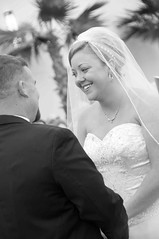


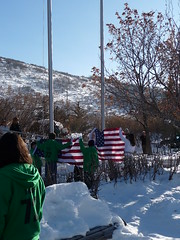

more photos on flickr
Notice: Undefined property: Default_Model_Pages::$_mapper in /home/o0z04hb7swmq/public_html/application/modules/default/models/Pages.php on line 42
Notice: Undefined property: Soldierstories_Model_Families::$_mapper in /home/o0z04hb7swmq/public_html/application/modules/soldierstories/models/Families.php on line 42



